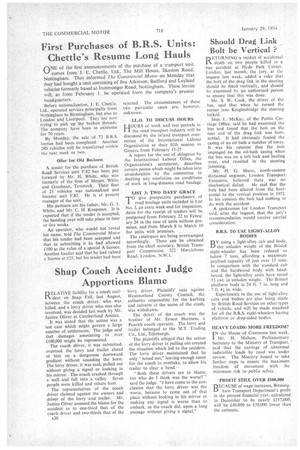Shap Coach Accident: Judge Apportions Blame
Page 22

If you've noticed an error in this article please click here to report it so we can fix it.
RELATIVE liability for a coach accident on Shap Fell, last August, between the coach driver. who was killed, and a lorry driver who was also involved, was decided last week by Mr. Justice Oliver at Cumberland Assizes.
It was stated that the action was a test case which might govern a large number of settlements. The judge said that damages • amounting to over £100,000 might be represented.
The coach driver, it was submitted, overtook the lorry and trailer ahead of him on a dangerous downward gradient without sounding the horn. The lorry driver, it was said, pulled out without giving a signal or looking in his mirror. The coach crashed through a wall and fell into a valley. Seven people were killed and others hurt. The representatives of the coach driver claimed against the owners and driver of the lorry and trailer. Mr. Justice Oliver assessed the blame for the accident as to one-third that of the coach driver and two-thirds that of the A20
lorry driver. Plaintiffs' case against Westmorland County Council, the authority responsible for the kerbing and culverts at the scene of the crash, was withdrawn.
The driver, of the coach was the brother of Mr. Ernest Hartness, a Pcnrith coach operator. The lorry and trailer belonged to the M.T. Trading Co., Ltd., Edinburgh.
The plaintiffs alleged that the action of the lorry driver in pulling out created the situation which led to the accident. The lorry driver maintained that he only "nosed out," leaving enough room for the coach to overtake, to allow his trailer to clear a bend.
"Both these drivers are to blame, but who do I think was the worse?" said the judge. "I have come to the conclusion that the lorry driver was the worse, because to come out of that place without looking in his mirror or making any signal is worse than to embark, as the coach did, upon a long passage without giving a signal."












































































